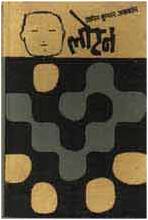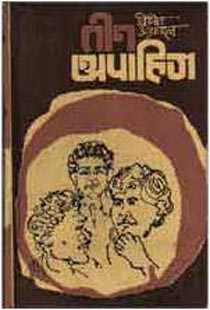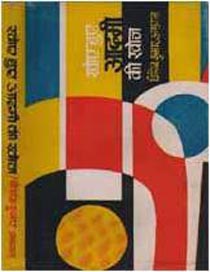
 The Artist
The Artist
Important Dates
Born On: 2nd April, 1931; Fatehpur(U.P.)
1952: M.Sc. Physics, University of Allahabad
1956: Head of Department of Physics, University of Allahabad
1990: Bhuvaneshwar Award
Died On: 8th July, 1989; America



लोटन
 |
We are surviving today in the midst of all the serious problems posed by industrialisation and its contradictions, only with the help of common sense. Who would lead a revolt against it - Man or the railway train? The question is meaningless because today both human life and the railway train face the same predicament and are interchangeable. The overloaded train, running along the tracks symbolises human life. And when anxieties and tensions cross beyond a limit, a breakdown occurs. It is only this crisis which can awaken the conscience and awareness in man and motivate him to acquire better control over his environment and make sacrifices for it. In the midst of all this fever, what persists - what remains unchangeable, becomes the starting point for creating a new order. That is 'Lotan'. The author of 'Teen Apahij' - Dr. Bipin Kumar Agarwal, once again helps us in understanding ourselves through his play 'Lotan'. What is this understanding? We can find out only by reading the play. |

तीन अपाहिज
|
The vague language and the absurd situations in these plays depict with great sensitivity the tensions and actions and reactions of contemporary life. This collection of plays by Bipin Kumar Agarwal introduces a new trend in the history of Hindi play-writing. Whenever and wherever 'Teen Apahij' was staged, it proved to be a new experience for the dramatis personae and the audience. Almost all the plays in this collection have been enacted on stage. These plays have emphasised modernism in literature and on stage. These plays communicate the reality of day to day existence by means of dramatic abstract elements. Sorrow, happiness, falsehood, truth, reality, dream, humour and satire-all mingle together to weave life. They all complement each other in life and also in plays. In this sense, the play gets its ideas from life and then the life follows the play. The plays in this collection fulfill this role fully. In whatever form we come in contact with these plays-as readers or as dramatis personae or as spectators-we never forget the experience. You would spontaneously adapt its dialogues. |

|

खोये हुए आदमी की ख़ोज
 |
'Teen Apahij' and 'Lotan', these later plays of Bipin once again introduce us to a new way of looking at life. -The first play in this collection is 'Maut Ek Kutte Ki' (Death of a Dog). It is a Sound Play. Sharp and penetrating conversation and the invocation of many assorted sounds in everyday life, create a new dimension in the Sound Play. -The Second play 'Abhivyakti' (Expression) is written for an actor and is a new experiment - an addition to the chain of familiar, well known and experimental plays of Bipin. -The third play 'Rashtra Samrat' (Ruler of a Nation) has a number of lively and symbolic characters present in any country. The play exposes the hollowness of the establishment and the suffocating life in any country - big or small. -The fourth play is a penetrating satire on life in the universities of our country. It produces laughter and compassion together, intensifying the tragedy. -The fifth play in the collection is in verse form titled 'Khoye Huye Aadmi ki Khoj' (In Search of a Lost Man). Like other Hindi plays written in verse form, it is not merely conversion of weak New Hindi Poetry into conversation form. Its language and poetry befits the play. The use of this form in an appropriate nanner makes this work quite unique and remarkable. |
 Home
Home Introduction
Introduction The Writer
The Writer The Scientist
The Scientist Painting Exhibitions
Painting Exhibitions